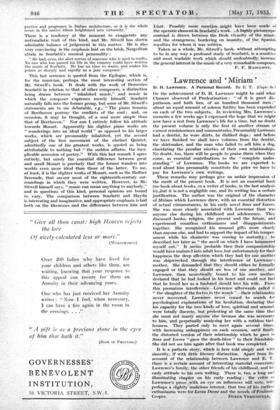Lawrence and Miriam D. H. Lawrence. A Personal Record. By
E. T. (Cape. 5s.)
OF the achievement of D. H. Lawrence might be said what Chaucer observed of Predestination : " of it is greet dis- ptitisoun, and hath ben, of an hundred thousand men ;" about an equal' amount of solemn futility has been expended on each of the two subjects. In reviewing Mrs. Lawrence's memoirs a few weeks ago I expressed the hope that we might now have a rest from Lawrence's life for a time, but no doubt the present volume is only the first of another stream of earnest reminiscences and commentaries. Presumably Lawrence had a dentist, he wore shirts, he disliked dogs ; and -before we have finished we shall have volumes from the dentist, the shirtmaker, and the man who failed to sell him a dog, elucidating the peculiar niceties of their own relationships. No doubt, too, there will be _people to praise them when they come, as essential contributions to the " complete under. standing " of Lawrence. The books we are expected to read about him presumably constitute the price we have to pay for Lawrence's own writings.
These remarks niay perhaps give an unfair impression of the merit of the present book. It is not an essential book (no book about books, or a writer of books, in the last analysis is),,but it is not a negligible one, and its writing has a certain justification. The author was the original of the character of _Miriam which Lawrence drew, with an essential distortion of actual circumstances, -in his early novel Sons and Lovers. She was more closely associated with Lawrence than was anyone else during his childhood and adolescence. They discussed books, religion, the present and the future, and experienced countless - enthusiasms and disappointments together. She recognized his unusual gifts more clearly than anyone else, and had to stipportihe impact of his temper- ament while his Character ' was coming to maturity : he described her later as," the anvil on which I have haminered myself out." It seems probable then- their companionship would have matured into adult love, but unfortunately for their happiness the deep affection whieh they had' fOr one another was shipwrecked through the interference ,of Laivrenee's mother.- She demanded that' they should either. be formally engaged -or that: they should see less of one another; and Lawrence, then neurotically bound to- his' own • mother, declared that he had looked in .his' heart and could not find that he loved her as a husband should love his wife. - From this premature interference_—Lawrente -afterwards called it " the slaughter of the foetusin the womb"—their relationship never recovered. Lawrence never ceased. to search for psychological explanations of his hesitation, declaring that his 'capacity for the two kinds -of loVe, spirithal and sensual, . were -totally discrete, but protesting at the same time that she must not marry anyone `else because she was necessary to him, -and perpetually analysing her with a ruthless tact- lessness. They parted only to meet again several time:, with increasing unhappiness on each occasion,' until finally the distorted version of their relationship which he gave in Sons and Lovers "gave the death-blow " to their friendship. She did not see him again after that book was completed.
It is a pathetic story, which is here told simply and with sincerity, if with little literary distinction. Apart -from the
account of the relationship between Lawrence and E. T.- there is a certain amount of interesting material concerning Lawrence's family, the other friends of his childhood, -and hi.
early attitude to -his own writing. There is, too, a long and illuminating chapter on his early reading : the critic of Lawrence's prose with an eye on influences will note, with perhaps a slightly malicious interest, that two of his earliest enthusiasms were for Lorna Doone and the novels of Fenitnoic Cuoper. DEREK VERSCIIOXLE,










































 Previous page
Previous page